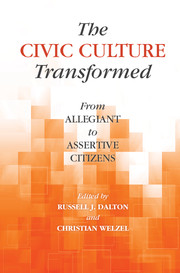Preface and Acknowledgments
Published online by Cambridge University Press: 05 January 2015
Summary
Sometime in the 1960–70s, the paradigm of comparative politics began to change in the established democracies. Until this point, one of the field’s major concerns was to explain the collapse of democracy in interwar Europe and the rise of fascist governments in their place. The landmark study, The Civic Culture, thus looked at postwar Europe and before to assess what type of political culture sustained democracy. Political culture research argued that people’s deference and allegiance to democratic institutions, combined with limited, elite-mandating mass involvement, were the foundation of stable democracy.
But societies and their people change. Mass prosperity, education, information, and other forces of social modernization were transforming citizens and the democratic process. New issue demands entered the political agenda, new citizen groups challenged the status quo, and a “participatory revolution” extended popular demands on governments. Usually, scholars and pundits depicted these developments as threats to democracy, often hearkening back to the model of citizenry proposed in the political culture studies of the early postwar era.
One of the first scholars to recognize the erosion of the allegiant model of democratic citizenship was Ronald Inglehart. He has been one of the strongest voices in the political culture field to object to the stereotypical interpretation of “elite-challenging mass action” as antidemocratic.
- Type
- Chapter
- Information
- The Civic Culture TransformedFrom Allegiant to Assertive Citizens, pp. xxvii - xxxPublisher: Cambridge University PressPrint publication year: 2014

